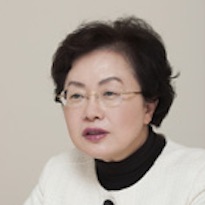GS6 Speakers
President, Korean Federation of Women’s Science & Technology Associations (KOFWST), Korea.
Harmonizing global and Local Perspectives for Gendered Innovation (download presentation here ![]() )
)
Plenary Panel 1: Pursuing Excellence in Research through Gendered InnovationsChair
Chair
Workshop: Gendered Innovations in Engineering Technology & Industry
Dr Hee Young Paik is Professor and Researcher of the Department of Foods and Nutrition, Seoul National University, Seoul, Korea, and currently working as the President of the Korea Federation of Women’s Science and Technology Associations. Prof Paik received all her degrees in the US. Her final degree is Sc.D. in Nutrition obtained from Harvard’s School of Public Health. From 1984 to 1992, She has been a faculty member at Sookmyung Women’s which are in Seoul, Korea. She also has served as the Minister of Gender Equality and Family, Republic of Korea, 2009-2011. She has received several honors including Excellent Research Awards in Science (2005), National Honor for High Achievements in Science (2008), and Asia-Pacific Clinical Nutrition Award (2009).
Summary of talk for Gender Summit 6 Asia-Pacific
Plenary Panel 1
The research team of Korea Federation of Women’s Science and Technology Associations (KOFWST) has been working to apply gendered innovations (GI) in research relating to various fields of science and technology. Although methods and cases developed in the US and EU have been extremely helpful, we have faced difficulties in applying these methods to specific cases. In general, analyzing sex is easily understood by scientists. The problem is that, more often than not, data are not adequately segregated by sex for analysis. Perhaps biological characteristics of human beings are not very different by countries or regions, and therefore, what has been known from the case studies of the US and EU may be applied more widely. On the other hand, the concept of gender is unfamiliar to most of scientists and therefore gender analysis is more difficult. This requires the understanding of social, cultural, and traditional characteristics of men and women pertinent to the specific case. Because gender concept depends so much on sociocultural environment, gender analysis conducted in one group may not be applicable to other groups. Global and regional comparisons and harmonization of gender analysis is necessary to realize the full potential of GI around the world.

